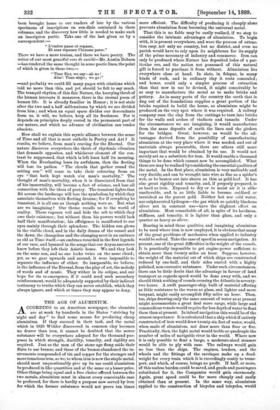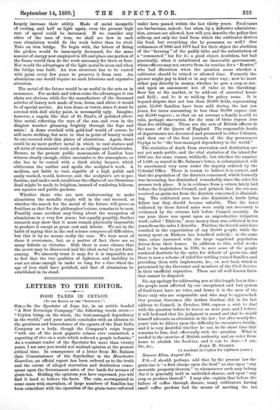THE AGE OF ALUMINIUM.
ACCORDING to an American newspaper, the chemists are at work by hundreds in the States " striving by night and day" to find some means for producing cheap aluminium. If they succeed in their task, and the metal which in 1828 Wohler discovered in common clay becomes no dearer than iron, it cannot be doubted that the newer substance will be everywhere adopted for the thousand pur- poses in which strength, ductility, tenacity, and rigidity are required. Just as the men of the stone age flung aside their flints to use bronze, and those of the bronze abandoned the in- struments compounded of tin and copper for the stronger and more tenacious iron, so we, to whom iron is now the staple metal, should most unquestionably give up its use could aluminium be produced in like quantities and at the same or a lesser price. Other things being equal and a free choice offered between the two metals, aluminium must in almost every conceivable case be preferred, for there is hardly a purpose now served by iron for which the former substance would not prove ten times
more efficient. The difficulty of producing it cheaply alone prevents aluminium from becoming the universal metal.
That this is no fable may be easily realised, if we stop to consider the intrinsic advantages of aluminium. To begin with, it is present everywhere, and were the process of extrac- tion easy, not only no country, but no district, and even no parish would have to rely upon its neighbours for its supply of the prime necessary of industry and commerce. Iron can only be produced where Nature has deposited lodes of a par- ticular ore, and the nation not possessed of this natural
gift is forced to purchase it from without. Aluminium lies everywhere close at hand. In slate, in felspar, in many kinds of rock, and in ordinary clay it rests concealed ; and hence, could only a simpler process of extraction than that now in use be devised, it might conceivably be as easy to manufacture the metal as to make bricks and pottery. As in many parts of the country the earth that is dug out of the foundations supplies a great portion of the bricks required to build the house, so aluminium might be produced on the very spot where it was required. A railway company uses the clay from the cuttings to turn into bricks for the walls and arches of viaducts and tunnels-. Under the circumstances we are imagining, it would manufacture from the same deposits of earth the lines and the girders for the bridges. Great, however, as would be the ad- vantages derived from the possibility of manufacturing aluminium at the very place where it was needed, and out of materials always procurable, there are others still more important that would be obtained by its use. It would not merely act as a substitute for iron. It would enable a thousand things to be done which cannot now be accomplished. What these are may be realised by considering the essential qualities of the metal. In the first place, aluminium is very malleable and very ductile, and can be wrought into wire as fine as a spider's web, or be beaten out into sheets as thin as gold-leaf. It has also great rigidity and tenacity, and, if properly prepared, is as hard as iron. Exposed to dry or to moist air it is alike unalterable, and is as little liable to become oxidised or tarnished as the purest gold. Neither hot nor cold water, nor sulphuretted hydrogen—the gas which so quickly blackens silver not in constant use—have the slightest effect on aluminium. Most remarkable of all, in spite of its hardness, stiffness, and tenacity, it is lighter than glass, and only a quarter as heavy as silver.
Bearing in mind these qualities, and imagining aluminium to be used where iron is now employed, it is obvious that many of the great problems of mechanics when applied to industry would be solved. Take the case of speed hi ocean navigation. At present, one of the great difficulties is the weight of the vessels. It is practically impossible to get engine-power sufficient to obtain more than twenty miles an hour. Suppose, however, the weight of the material out of which ships are constructed reduced by one-half, and their sides coated with a highly polished, non-corrosive substance. Under such circumstances, there can be little doubt that the advantage in favour of land transport as regards speed would be done away with, and we should think nothing of vessels crossing the Atlantic in seventy- two hours. A swift passenger-ship, built of material offering as little resistance to the waves as glass, and lighter and more bouyant, might easily accomplish fifty miles an hour. Then, too, ships drawing only the same amount of water as at present might accommodate a great deal more cargo, while large and commodious vessels would require far less depth of water to float them than at present. In inland navigation this would be of the utmost importance. It is calculated that a ship which if entirely constructed of iron would draw twenty-six feet of water, would, when made of aluminium, not draw more than four or five. Practically, then, the light metal would treble or quadruple the number of miles of navigable river in the world. Where now it is only possible to float a barge, a moderate-sized steamer would be able to ply with ease. The railways would gain no less than the ships. The engines, tenders, and the wheels and the fittings of the carriages make up a dead- weight for every train which it is exceedingly costly to trans- port, and which, of course, brings no profit. If half, or more, of this useless burden could be saved, and goods and passengers substituted for, it, the Companies would gain enormously. Again, great speed could be far more cheaply and easily obtained than at present. In the same way, aluminium applied to the construction of bicycles and tricycles, would
largely increase their utility. Made of metal incapable of rusting, and half as light again, even the present high rate of speed could be increased. If we consider any other of the uses of iron, we shall see how in each case aluminium would do the work better than its rival. Take an iron bridge. To begin with, the labour of fixing the girders would be immensely decreased, for the same amount of energy now employed to lift and place one portion of the frame would then do the work necessary for three or four. Nor would the advantages of the light metal be at an end when the bridge was built. An iron structure has to be coated with paint every few years to preserve it from rust. An aluminium one would require no such laborious and expensive attention.
The metal of the future would be as useful in the arts as in commerce. For medals and token-coins the advantages it can claim are obvious, while for the manufacture of the thousand articles of luxury now made of iron, brass, and silver, it would be of special service. An iron dome or tower, since it must be covered with dull sticky paint, is necessarily ugly. Imagine, however, a cupola like that of St. Paul's, of polished silver- blue metal, reflecting the rays of the sun, and even in the .dingiest weather gleaming brightly through the fogs and mists ! A dome overlaid with gold-leaf would, of course, be still more striking, but next to that in point of beauty would be one covered with thin plates of aluminium. Again, there could be no more perfect metal in which to cast statues and all sorts of ornamental work, such as railings and balustrades. Bronze, as the present public monuments of London bear -witness clearly enough, either succumbs to the atmosphere, or else has to be coated with a thick sticky lacquer, which obliterates the outline and spoils the sculptor's work. A medium, not liable to rust, capable of a high polish and easily worked, would, however, suit the sculptor's art to per- fection; and under such conditions the effigies of our illustrious dead might be made to brighten, instead of rendering hideous, our squares and public gardens.
Whether those who are now endeavouring to make aluminium the metallic staple will in the end succeed, or -whether the search for the metal of the future will prove as fruitless as that for the philosopher's stone, remains to be seen. Possibly some accident may bring about the usurpation of aluminium in a very few years ; but equally possibly, further research may show that it must remain physically impossible to produce it except at great cost and labour. We are in the habit of saying that in the end science conquers all difficulties, but this is by no means really the case. We hear most of those it overcomes ; but, as a matter of fact, there are as many defeats as victories. Still, there is some chance that the secret may be discovered and the ideal metal be yet forth- coming. We sincerely trust it may, for it is impossible not to feel that the two qualities of lightness and inability to rust are alone enough to make us long for a time when the age of iron shall have perished, and that of aluminium be established in its stead.



































 Previous page
Previous page